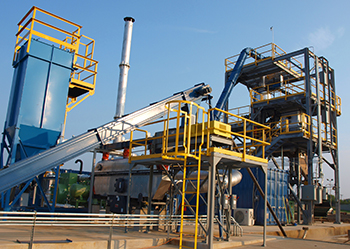 LEBANON, Tenn. — The city of Lebanon, Tenn., is using a new technology that will provide an environmentally sustainable method of waste disposal and produce green power in the process.
LEBANON, Tenn. — The city of Lebanon, Tenn., is using a new technology that will provide an environmentally sustainable method of waste disposal and produce green power in the process.
Lebanon signed a deal with Antioch, Tenn.-based PHG Energy (PHGE), which will provide a downdraft gasification plant for city use. The technology inside the plant cleanly converts up to 64 tons per day of blended waste wood, scrap tires and sewer sludge into a fuel gas that will generate up to 300 kilowatts (kW) of electricity. The power generated will help provide for the plant’s internal power needs and will contribute electricity to the wastewater treatment plant where it will be located.
“This is not incineration or burning,” Lebanon Mayor Philip Craighead said in a statement. “There is no smoke or odor. The feedstock material is broken down at very high temperatures in a sealed vessel, and about 95 percent of what goes into the gasifier comes out as the fuel gas.”
Craighead also noted the remaining 5 percent to 10 percent of material exiting the gasifier is a high-carbon biochar that can be recycled or sold for agricultural or industrial uses.
The Lebanon project will be what PHGE believes is the world’s largest downdraft gasifier. The large frame gasifier, as the company refers to it, went through a rigorous testing process for more than two years at PHGE’s research facility. A standard PHGE gasifier can convert up to 12 tons of feedstock, or raw material that helps to run the machine, per day to fuel gas, while the Lebanon model will process up to 64 tons per day without substantially increasing the footprint of the plant.
“This is the same basic technology we utilized in all our previous designs, and we have upgraded capacity and power density to accomplish a lot more gasification in what is not a lot more space,” PHGE President Tom Stanzione said in a statement.
The plant is projected to keep more than 8,000 tons of material out of landfills each year. Carbon dioxide emissions will be reduced as well, keeping more than 2,500 tons out of the atmosphere each year. That equates to the carbon dioxide produced annually to provide electricity to 312 homes or the annual Greenhouse Gas Emissions from more than 450 passenger vehicles, according to the Environmental Protection Agency (EPA).
The $3.5 million required to operate the plant has been obtained through a federal program that awards bond subsidies to local projects that conserve energy. Those Qualified Energy Conservation Bonds are allocated through the Tennessee Department of Environment and Conservation (TDEC), and repay communities about 70 percent of interest expense.
The Lebanon project will mark the 14th gasifier installation for PHGE. The company’s first municipal installation was commissioned in Covington, Tenn., in 2013. PHGE expects to have the plant up and running sometime in 2016.

